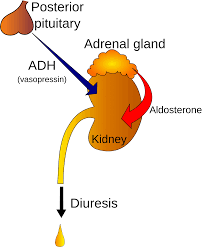Caffeine & Diuresis
Like "breaking the seal" on a night out, an eventual trip to the bathroom after your morning coffee is nearly guaranteed. Why does this happen?

Author: Jarret Morgan, PharmD Candidate
Editor: Brentsen Wolf, PharmD
Everyone loves a cup of coffee or tea in the morning. Sipping that cup o' Joe is so invigorating that we've all come to accept the side effects of caffeine that come with it. Similar to "breaking the seal" on a night out, an eventual trip to the bathroom after your morning coffee is nearly guaranteed. But why does this happen?
We've always been told that caffeine is a diuretic that can cause you to rush to the bathroom. It wasn't until going through my renal therapeutics module that I ever questioned this. I tried to understand how caffeine increases urination and why it happens. Why does a compound like caffeine, which I use to wake myself up in the morning, have such a weird effect at a totally different site in my body?
All oral medications, food, and drinks, must be ingested, digested, and absorbed from the gastrointestinal tract into systemic circulation. Once in your blood stream, they're able to distribute across your body and into the various tissues. Excluding the properties necessary to cross the blood-brain barrier, this is how caffeine not only gets to your brain, but also your kidneys and every other organ in your body.
Caffeine, as previously discussed, is an adenosine receptor antagonist. We use it to prevent sleepiness that comes with agonistic activity at those receptors in the brain. To be more specific, caffeine is a non-selective adenosine receptor antagonist. Different subtypes of adenosine receptors are also found in your kidneys where they play an important role in regulating fluid balance through the tubuloglomerular feedback system.

Your nephrons are responsible for filtering your blood. If the sodium concentration of your blood breaches the upper threshold of the regulation window in the late-ascending loop of Henle and distal convoluted tubule, Macula Densa cells (with the aid of the Na+/K+ ATPase) will reabsorb sodium and generate adenosine in the process. This adenosine will act in two important ways. Firstly by making its way to the juxtaglomerular cells where it will bind to Gi coupled-receptors and inhibit renin secretion (prevents increasing the glomerular filtration rate (GFR) by angiotensin II and increased sodium reabsorption by aldosterone). Secondly by binding to Gq coupled-receptors causing vasoconstriction at the afferent arteriole (the one going into the glomeruli) which decreases the GFR. You must remember that caffeine is blocking/antagonizing these adenosine receptors. Therefore, caffeine actually increases renin production (RAAS) and dilates the afferent arteriole which increases GFR and urinary output.
Does it stop there? No, no it doesn’t.

Caffeine also inhibits the release of antidiuretic hormone (ADH or vasopressin). ADH normally increases the expression of aquaporins in the collecting ducts of your nephrons, which increases reabsorption of water (decreasing the luminal water content of your nephron’s collecting ducts). However, by inhibiting ADH secretion, caffeine effectively increases the luminal water content in the nephron’s collecting ducts.
We drink our morning coffee so that we can displace adenosine and feel more alert and oriented. But we're also blocking the adenosine receptors on our juxtaglomerular cells, increasing GFR, and consequently our urine output. On top of that, inhibiting ADH secretion from our hypothalamus prevents the reabsorption of water in the collecting ducts, increasing urinary volume. Classic double whammy.
Author Bio: Jarret Morgan is a 2nd year pharmacy student at the Southern Illinois University of Edwardsville and a part-time inpatient pharmacy technician at a local hospital. He aspires to one day attain a fellowship in the pharmaceutical industry where he can broaden his skillset and make a difference at the macro-scale. In his free time, Jarret enjoys exercising, playing sports/video games with his wife, and spending time with his grandfather.

*Information presented on RxTeach does not represent the opinion of any specific company, organization, or team other than the authors themselves. No patient-provider relationship is created.

